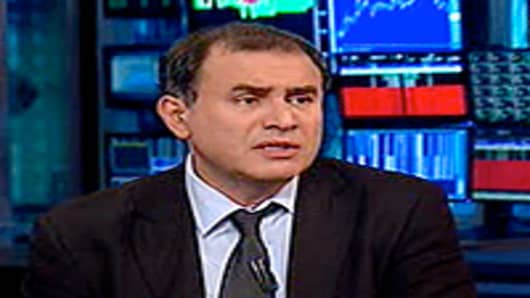Recent weeks have seen the rhetoric from both sides of the Greek tragedy ramped up with naysayers claiming the days of the Hellenic Republic’s membership of the euro zone are numbered, and others insisting the bloc will stay intact come what may.
Well respected names within the global financial community have come out to state their preferred solution for the now convoluted mess that the region finds itself in.
Nouriel Roubini, chairman of Roubini Global Economics and dubbed Dr Doom for his pessimistic economic predictions, has called for outright euro zone reorganization.
In an opinion piece for the Financial Times newspaper, Roubini argued that the bloc needed to seek a ‘divorce’ from vulnerable members – Greece, Portugal, Italy, Ireland and Spain, leaving the euro zone with a stronger core. He insisted that, although hard, managing an amicable exit strategy would be in everybody’s interest.
The impasse generated by the May 6 vote, which produced no clear winner and sharpened the boundaries in Greece has heightened the euro zone’s crisis to a level once believed to be unthinkable – the fracture of the 17-nation group.
As Greeks vote on Sunday there is much apprehension that Syriza – a far left party that insists the existing bailout agreement for the country must be renegotiated and has threatened to stop interest rate payments – will build on its existing popular support. However, leader Alex Tsipras has insisted that he does not think Greece should leave the euro zone.
Harvard Professor Martin Feldstein told CNBC the situation had gone too far for Greece to remain a viable member of the single currency and the best situation would be for Greece “to leave the euro zone, devalue a new currency” as it was now “beyond repair.”
This sentiment was echoed by Nick Dewhirst, director at wealth management firm Integral Asset Management who said Greece would leave the euro zone on June 18 if the populist government were to be elected and it would be “better for Greece to leave.” He said the country would be better off once the initial problems subside as a new currency was introduced, unemployment would fall and tourism would boom.
Officials from European countries and the European Union itself have maintained a consistent line that there would be no exit of any country from the euro zone. Earlier this week, Vitor Constâncio, vice president of the European Central Bank , told CNBC that the exit of any nation from the euro zone would be “catastrophic.”
Many analysts agree and do not believe that a Greek departure will actually transpire. Ian Harnett, European Strategist at Absolute Strategy Research, told CNBC that European leaders would do whatever it takes to keep the euro project alive.
“All those people who told you last year that Greece would be out of the euro zone by the end of 2011 were wrong. We still believe that the euro will have 17 members by the end of this year and whatever needs to be done Germany will do that,” Harnett said.


